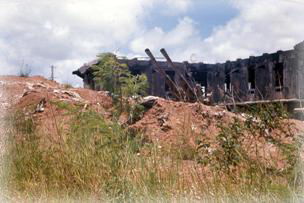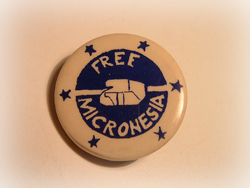What I Did in the War
I was at the time, and I remain today, proud of my service in the Peace Corps.
Although, even as I write it, I think that “proud” might not be the best word to describe my feelings about what I did back then. Especially when I think of the tens of thousands of Americans of my generation who served their country differently and died in a tragically flawed and futile war as a consequence.
Maybe it would be more accurate to say that, even in those terrible times, I was not ashamed of my Peace Corps service. I was honored by it. I think I did a good thing by becoming a Peace Corps Volunteer. At least, I hope I did.
But will I ever really be sure?
I know for a fact that the Peace Corps changed me. It made me a stronger person and a more compassionate one. It made me more enlightened—wiser, more perceptive, more open-minded; more aware of the world around me and the people in that world. It made me, for want of a better word, better.
But that’s a truism of Peace Corps service, isn’t it? It’s what we all say and mean sincerely when we say it: “The Peace Corps made me a better person.”
Not that that’s anything to sneeze at. I'm all for anything that makes anyone better.
What I fear, though, is that the Peace Corps was—at least for me—a one-way street. I know what the people of Yap did for me. I can tell you clearly and in detail, even after all these years.
What worries me is whether or not I did anything for them in return, whether the work I did had any lasting effect. Did I leave even one of those lovely people whose lives intersected so briefly with mine anything that proved to be meaningful or helpful or worthwhile in the least in the years that have since passed?
It’s not as if I was an agricultural worker on Yap. Or an engineer. Or a doctor or a nurse. Anyone, in fact, whose work produced tangible results that you could see almost immediately. It’s not even as if I was a business advisor there; or, even less likely, a lawyer.
Instead I did what most of us early Micronesia Volunteers did: I taught English.
Not that you couldn’t tell whether or not your students were learning anything, of course—although the fabled Yapese unwillingness to be seen by outsiders as putting themselves forward in any way whatsoever sometimes made that difficult to know for sure.
No, that wasn’t really the problem.
The problem was (or this is how I put the problem to myself): why was so much effort being expended on teaching English in Micronesia anyway? Why was it so important? And to whom?
Since the United States was the administering authority of the Trust Territory, a lot of us early Micronesia PCVs (the more cynical ones, I’m afraid) tended to see our own country, not Yap, as the host country. Consequently, it was hard for us not to see the words "Self-Serving" flashing on and off in our heads whenever we wondered about US motives in Micronesia. Were we teaching English because the Micronesians wanted us to? Or were we teaching it because the United States did? And if the latter, then to what end?
Of course I could see the value in young Micronesians’ learning to speak a language that would give them greater access to the world beyond their homes, access that would allow them to acquire more education, which would, in turn, make it possible for them to help themselves and their people to a greater extent than might otherwise have been possible. So if Micronesians were asking for this horde of American English teachers, then great! Clearly I was doing a good thing.
But even at the time—and it was a dark time, indeed, that spawned many dark rumors—there were, in fact, darker Micronesia rumors. In one of the darkest, Micronesia played a strategic role in America’s long-range military plans: if the US ever had to pull out of its other Pacific strongholds, then it would have the islands of Micronesia, with an English-speaking workforce, ready and waiting for US armed forces to fall back on and move into.
The Peace Corps as language trainers for the military! Now there’s a 60s peace movement conspiracy theory for you, if ever there was one.
A story like that might make you smile today—or not; I don’t know—but when you were on a remote island, with poor outside (and inside, for that matter) communications, and not an awful lot of current information ready at hand, when you were closer to Vietnam by several thousand miles than you had been a year earlier and could see patent evidence of wartime activity and materiel only 500 miles away on Guam, then that specific conspiracy theory all too easily began to seem not only possible but, in fact, probable.
Especially if you were having doubts about whether or not you were accomplishing anything at all worthwhile in the work you were doing.
Well, time and circumstances have rendered the language-training-for-military-support-services theory baseless (and, yes, I’m afraid I really did intend that rather awful pun). Instead, in the creation of independent countries in Micronesia governed by the people of Micronesia, who, with their English-language skills, have been able to interact more than they ever could have previously among themselves and with the world at large, time and circumstances have shown that those of us who were Peace Corps English teachers actually did do work that had positive consequences.
Not that statehood, facilitated by common-language skills, doesn’t have its own dark side.
In the most recent “Friends of Micronesia” newsletter, there's a reprint of the summary comments made by Father Francis Hezel, executive director of the Jesuits’ Pohnpei-based Micronesian Seminar, on reports on governance in Palau, the Marshalls, and the Federated States that were commissioned by the Australian Agency for International Development and carried out by Transparency International, an NGO with headquarters in Berlin that has as its mandate combating corruption worldwide.
Leaving aside the confluence of presumptions, ironies, and hubris in that sentence, let me go ahead and tell you that Transparency International did, in fact, find that corruption was a problem in these young countries. Not a huge problem yet, but a problem that bears watching.
Well, yes. Yes, I think we’d all agree that corruption, on any scale, is a problem that bears watching.
But what bothers me even more than the findings of those reports is this:
The most egregious instances of corruption that Transparency International adduces involve government funds—supplied (no surprise here) by industrialized countries like Australia and the United States—funds that are only there to be used corruptly because the Republic of Palau, the Federated States of Micronesia, and the Republic of the Marshall Islands are now governments in their own right with the ability to use or abuse public funds as they choose. Which means they are now able to play by different rules and now—thanks to the monies and examples of older, larger, more experienced governments, like those carrying out the corruption studies—have the resources and role models that allow them to do so.
Of course there’s corruption, you want to scream. Whyever in God's name wouldn’t there be?
Which only brings me back to my original question. At least, I think it does.
Did I do a good thing by teaching English on Yap all those years ago? Or not?
I hate to think that my work as a Peace Corps Volunteer might have contributed—in even the smallest way—to the disheartening, but all too understandably human, state of affairs that is now, apparently, taking root in that far-off, beautiful place.
On the other hand, that could just be the bleeding-heart-liberal ego in me whining for a little belated recognition and thanks.
Maybe the Peace Corps didn’t make me such a good person after all.
Frank Glass
New York, NY
September 2005



Photo by Art Hegewald
Photo by Frank Glass